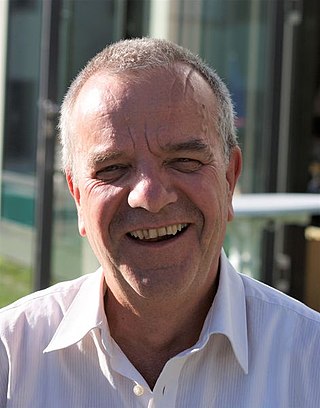Related Research Articles

Karl Ludwig Hampe was a German historian of the Middle Ages, particularly the history of the Holy Roman Empire in the High Middle Ages.
Hermann Ulrich Kantorowicz was a German jurist.

Johannes Fried is a German historian, professor, and medievalist.
Hartmut Boockmann was a German historian, specializing in medieval history.
Hellmut Diwald was a German historian and Professor of Medieval and Modern History at the University of Erlangen-Nuremberg from 1965 to 1985.

The Academy of Sciences and Literature is a scientific academy in Mainz, Germany. It was established in 1949 on an initiative of Alfred Döblin. The academy's goal is to support science and literature, and in doing so to help preserve and promote culture.
Wilhelm Vöge was a German art historian, the discoverer of the Reichenau School of painting and one of the most important medievalists of the early 20th century. Whitney Stoddard called him the "father of modern stylistic analysis" for medieval art.
Sieglinde Hartmann is a German medievalist, expert on the medieval poet Oswald von Wolkenstein and president of the Oswald von Wolkenstein-Gesellschaft.

Rudolf Schieffer was a German historian specializing in medieval history. From 1994 to 2012 he was president of the Monumenta Germaniae Historica.
Helmut Karl Otto Beumann was a German historian.
Klaus Zechiel-Eckes was a German historian and medievalist.

Heinrich Morf was a Swiss linguist and literary historian.

Michael Borgolte is a German Historian. Besides the history of medieval endowments he studies mainly the Comparative history of Europe and the Global history of the Middle Ages.
Walther Rehm was a German literary scholar.
Franz Schnabel was a German historian. He wrote about German history, particularly the "cultural crisis" of the 19th century in Germany as well as humanism after the end of the Third Reich. He opposed Nazism during the Second World War.
Hans-Christof Kraus is a German historian.
Rudolf Vierhaus was a German historian who mainly researched the Early modern period. He had been a professor at the newly founded Ruhr University Bochum since 1964. From 1971, he was director of the Max-Planck-Institut für Geschichte in Göttingen. He became known for his research on the Age of Enlightenment.
Matthias Untermann is a German art historian and medieval archaeologist.
Gerlinde Huber-Rebenich is a German philologist. She specializes in medieval and neo-Latin literature, and the medieval reception of Ovid.
Robert Holtzmann was a German Medievalist historian. He was something of a pioneer for what became an important post-war historiographical approach, respected among historians, in particular, as an authority on the Ottonians and their times, both during his life and for many years following his death.
References
- Bernhard Bischoff: [Obituary]. In: Jahrbuch der Bayerischen Akademie der Wissenschaften (1964), pp. 179–183.
- Franz Brunhölzl : Paul Lehmann. In: Forschungen und Fortschritte Jg. 39 (1965), pp. 94–95.
- Peter Wirth [in German] (1985), "Lehmann, Paul", Neue Deutsche Biographie (in German), vol. 14, Berlin: Duncker & Humblot, p. 92; ( full text online )